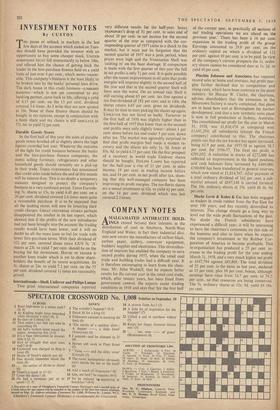INVESTMENT NOTES
By CUSTOS THE pause or setback in markets in the last few days of the account which ended on Tues- day should have provided the investor with an opportunity to buy some cheaper stock. UNITED DOMINIONS TRUST fell momentarily to below 100s. and offered him the chance of getting back the leader in the hire-purchase finance field on a yield basis of just over 4 per cent., which seems reason- able. This company's business is the least likely to be broken into by the banks' peisonal loan drive. The dark house in this credit business-LOMBARD BANKING-which is not yet committed to any banking partner, came back to 18s., offering a yield of 4.15 per cent. on the. 15 per cent, dividend covered 3.6 times. As I write they are now quoted at 19s. None of these finance shares should be bought in my opinion, except in conjunction with a bank share and my choice is still BARCLAYS at 57s. 6d. to yield 5+ per cent.
Durable Goods Stores In the firSt half of this year the sales of durable goods stores levelled off at slightly above the high figures recorded last year. Whatever the outcome of the fight for credit business between the banks and the hire-purchase finance companies, the stores selling furniture, refrigerators and other household goods should certainly see a pick-up in their trade. TIMES FURNISHING has announced that credit sales made before the end of this month will be interest-free. This is no doubt a temporary measure designed to protect the company's business in a very confused period. Times Furnish- ing 5s. shares at 15s. to yield 6.45 per cent. on a 20 per cent. dividend covered 2.6 times seem quite a reasonable purchase. It is to be expected that all the leading stores will now be lowering their credit charges. GREAT UNIVERSAL STORES perhaps disappointed the market in its last report, which showed that if the profits of the new subsidiaries had not been brought into the account the trading results would have been lower, and it will no doubt be all the more keen to bid for trade with lower hire-purchase terms. With their dividend of 32+ per cent, covered about twice GUS Ss. 'A' shares at 23s, to yield 7 per cent. should be on the buying list for investment. HOUSE OF FRASER is another keen trader which is yet to show share- holders the benefit of its recent acquisitions. Its 5s. shares at 24s. to yield 7.2 per cent, on the 35 per cent, dividend covered 11 times are reasonably priced.
Internationals-Shell, Unilever and Philips Lamps Two great international companies reported very different results for the half-year. SHELL TRANSPORT'S drop of 5/ per cent. in sales and of about 38 per cent, in net income for the second quarter of the year as compared with the cor- responding quarter of 1957 came as a shock to the market, but it must not be forgotten that the second quarter of 1957 was a peak period, when prices were high and the Venezuelan Shell was `cashing in' on the Suez shortage. If comparison is made with the first quarter of this year the fall in net profits is only 7/ per cent. It is quite possible after the recent improvement in oil sales that profit margins will improve slightly in the second half of the year and that in the second quarter Shell will have seen the worst. On an annual rate Shell is still earning about 65 per cent, tax free against a tax-free dividend of 18+ per cent, and at 140s. the shares return 4.65 per cent, gross on dividends. It may be time to start picking the shares up again. UNILEVER has not fared so badly. Turnover in the first half of 1958 was slightly higher than in the first half of 1957 (but lower than in the second) and profits were only slightly lower-about 1 per cent. down before tax and under 5 per cent. down after tax. The market was agreeably surprised to find that profit margins had made a modest re- covery and the shares are only Is. 3d, lower at 83s. 9d. to yield 4.15 per cent. On the first prospect of a recovery in world trade Unilever shares should be bought. PHILIPS LAMPS has reported for the half-year a rise of 11 per cent, in sales income, 19 per cent. in trading income before tax, and 14 per cent. in net profit after tax, show- ing that this well-managed company has been improving its profit margins. The ten-florin shares are a sound investment at 62s. to yield 4+- per cent, on the 14 per cent, dividend which was last covered 2.3 times.


































 Previous page
Previous page